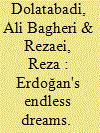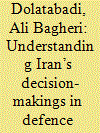| Srl | Item |
| 1 |
ID:
183732


|
|
|
|
|
| Summary/Abstract |
After the Justice and Development Party (AKP) rose to power in 2002, Turkey's Middle East policy underwent a radical change. Erdoğan's readings of the Arab Spring events are a vivid example of Turkey's new foreign policy. In the last months of 2019 and 2020, Turkey took two other important steps that have attracted the attention of the international community: engagement in Operation Peace Spring in northern Syria without UN Security Council authorization, and steps to reach an agreement with the Libyan government on oil and gas exploration in the Mediterranean in tandem with sending troops to Libya. Turkey's recent actions, which violate international law and UN resolutions, raise several questions: what changes have taken place in Turkey's foreign policy? What are its core drivers and main components? And what results will the new policy deliver in the future? We argue that Turkey's behavior conforms to the principles of offensive realism. The shift in Turkey's foreign policy and the trend toward offensive realism are rooted in the 2011 Arab Spring and subsequent events in the Middle East. The failed coup of 2016 accelerated these changes and pushed them in new directions. Turkey is now seriously aiming to maximize its power, particularly in the politico-military field, which could increase tensions in the sensitive region. We submit that Turkey cannot be guided by offensive realism in the long term, however.
|
|
|
|
|
|
|
|
|
|
|
|
|
|
|
|
| 2 |
ID:
172298


|
|
|
|
|
| Summary/Abstract |
The main question of the present study is: How is it that despite the West’s insistence on negotiation on Tehran’s missile programme and the possibility of sanctions being intensified in the event of Iran’s refusal, the Tehran authorities reject any negotiations in this regard? The findings of the present study indicate that Iranian political authorities, and in particular, the Iranian Leader, have a realistic view towards the country’s defence issue and continue to lay emphasis on such measures as increasing military capability, establishing a balance of power and self-sufficiency in arms manufacturing. Iran’s fears of replication of Iraq’s and Libya’s disarmament and the subsequent overthrow of the political systems of these governments, distrust in the West in the negotiations and the related consequences, lack of a strategic partner, the bitter experience of war with Iraq, and the continuous threats made by the USA and Israel have caused Iran to reject any request for negotiations about its missile programme.
|
|
|
|
|
|
|
|
|
|
|
|
|
|
|
|